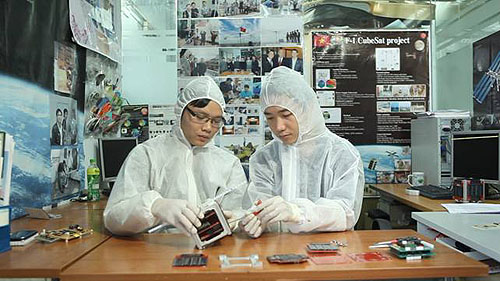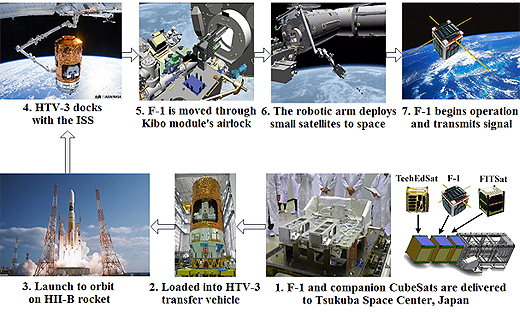This is an archive of information released in the past.
Disclaimer: It may contain broken links or outdated information. Some parts may not function in current web browsers.
*Visit https://humans-in-space.jaxa.jp/en/ for the latest information.

F-1 and companion CubeSats to be deployed to space from Kibo module on September 27
From the first launch in 2003, CubeSats (small satellites weighting just a few kilograms) have caught interest from many universities and institutions around the globe. More than 100 CubeSat projects are ongoing worldwide. Unlike traditional big, heavy and expensive satellites, which needs many years to build, CubeSats are smaller and can be quickly built in a few years with less cost. Moreover, CubeSat projects create good opportunities not only to educate young engineers and students of aerospace engineering but also to perform scientific/technological experiments in space.
In order to enhance the capability of Kibo's utilization and to offer more launch opportunities to CubeSats, JAXA plans a demonstration of small satellites deployment from the Japanese Experiment Module "Kibo" of the International Space Station. Five satellites have been selected, including RAIKO (Wakayama and Tohoku University), FITSAT-1 (Fukuoka Institute of Technology), WE WISH (Meisei Co.), TechEdSat (NASA Ames) and the F-1 (FPT University).

FSpace engineers assembling F-1 CubeSat
F-1 CubeSat was developed by young engineers and students at FSpace laboratory of the FPT University in Hanoi, Vietnam under the collaboration with the Uppsala University in Sweden and the NanoRacks LLC. in the United States. The satellite measure is 10x10x10cm, and weight is 1kg. Mission of the F-1 are to "survive" the space environment for at least 1 month, measuring temperature and magnetic data, and take low-resolution photos of the Earth. All five CubeSats were loaded into Kounotori-3 (HTV-3 transfer vehicle), launched into orbit from Tanegashima Space Center on July 21 and reached to the ISS on July 28th.
Currently, deployment of five CubeSats from Kibo module is planned for September 27. It is estimated that the orbital lifetime of the CubeSat after release from the ISS is 250 days.

FSpace engineers assembling F-1 CubeSat
| Copyright 2007 Japan Aerospace Exploration Agency | Site Policy |
